#janne robinson
Text

10 notes
·
View notes
Text
these mornings
the world is too big
no one holds my hand
i feel so alone
in the warmest of embraces
i wish my heart away
my life even.
i heave.
the sadness doesn’t leave.
i don’t want to live here
in my body i mean.
i am a foreigner.
a black man
in Corpus Christi.
#poetry#love poem#3 am feelings#3 am mood#it's 3am#poem#poets on tumblr#book club#janne robinson#lovers#random late night thoughts#black lives are important#black lives count#black lives have value#black lives matter#poetsofinstagram#sad poetry#2am shitpost#new poets society#poets corner
10 notes
·
View notes
Text
I hope you risk. I hope you fall so you can only see the jump wasn't as big as you thought it was. I wish the ground to hit your feet and see your smile and your tears when you discover the space what was there all along
Janne Robinson
5 notes
·
View notes
Text
i leave proofs of my life in post-it notes. i imagine an apocalypse. a young boy, a survivor, finds a pack of these notes, strewn, fading. i see him light up, picks it up. the words 'y u a e orth it' splashed across, picks up more. 'yo ar g ng to ace th s', 'you are lov d' , 'i am ok y'. i imagine these words patching up the hope he has left. sewing it ruggedly. i imagine that is enough impact, as invisible as i feel.
just random thoughts
#poetry#sex-averse#sadgirl#book club#random late night thoughts#janne robinson#single#deep thoughts#queer stuff#queer poetry
2 notes
·
View notes
Text
THERE’S ASSHOLES DANCING
and there's assholes wishing they were dancing.
0 notes
Text
"I am fire — if you want something salty and sweet, with no opinion, I am not the woman for you. I spit flames, often."
— Janne Robinson
771 notes
·
View notes
Text
Lewisohn vs. Wenner Pt. 2 of 2
Part 1 // More Tune In analysis
You probably know the drill by now: I'm looking at the quotes from Tune In against the source Mark Lewisohn gives for them, and seeing if they're faithfully reproduced. This post deals with the multi-source Frankenquotes that are partly attributed to Jann Wenner's interviews. Five of the quotes here are from the infamous Lennon Remembers interview, with a sixth from a separate interview for Rolling Stone. Lewisohn combines John's words from these interviews with a myriad of other sources: a televised interview of John by Jean-François Vallée (1975), Hunter Davies’ The Beatles (1968), an interview/cohosting spot on The Mike Douglas Show (1972), and an interview with Lisa Robinson for Hit Parader (1975).
Before I get into it, I wanted to take a moment to discuss how I ‘grade’ Lewisohn’s quotes based on the type of source he cites. If Lewisohn is using a recorded interview, there’s some wiggle room in things like punctuation and word stress. When transcribing the same interview, two people might listen to the same phrase and come away with slightly different versions, e.g. “My favorite color was blue, but that changed after the accident in the paint factory,” vs. “My favorite color was blue. But that changed after the accident in the paint factory.” Both of those could be correct interpretations of the same recorded audio, so I can’t fault Lewisohn for changes along those lines when he’s working from an audio source.
There isn’t the same wiggle room when working from text. If I pull a quote from a book, and the book reads, “Now, I love green. It’s so lush,” I can’t change that to, “Now I love green; it’s so lush.” I’m not actually quoting the person who said those words originally—I’m quoting the transcribed and published version of what that person said.
I've taken this into account with these Frankenquotes. If there are punctuation differences between Tune In and the printed version of Lennon Remembers pictured here, I haven’t made note of them. Those same differences in a quote pulled from Davies’ The Beatles will be noted, since Lewisohn is quoting the printed source and not an original audio tape. This becomes a bit confusing when a single “quote” is compiled from different sources, and the bits from one source are graded on a different rubric than the other, but such is the thrill of fact-checking Mark Lewisohn!
Citations at the end. Time stamps refer to this upload of the Lennon Remembers interview.
Tune In 4-12 vs. Wenner p.76 (2:14:41), 18 (36:24) + Vallée Interview
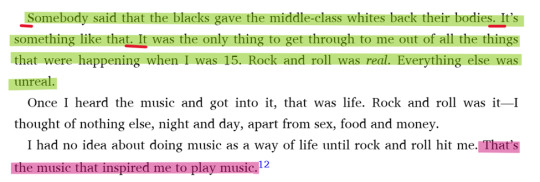


I haven't been able to track down the source for the middle section of this Frankenquote (it’s from an interview by Jean-François Vallée for the French TV Series Un jour futur, in the episode “Il était une fois: John Lennon.”), nor did I find the first sentence of the third part of the quote. It isn’t in the printed version of Lennon Remembers, and it doesn’t appear before the final sentence in the audio, though perhaps it’s elsewhere on the tape.
This has several classic Lewisohn offenses: stitching together multiple sources, combining distinct sections of a single source into one quote, and phrases omitted without ellipses. I've noted these on the images above.
What I'd like to bang on about is Lewisohn's choice not to clarify who John is referencing at the start of the quote--the "somebody" discussing black music and white bodies. In the original interview, John credits it to either "Michael X or Eldridge Cleaver" (Lennon Remembers gives this as Malcolm X, but it's clearly Michael X on the tape--see end of post for some background on Michael X and Lennon). It's common practice by many authors to clarify ambiguous references like this; Mark Lewisohn even does it in Tune In. He mostly does this in the endnotes (e.g. P-4, 2-22), but he uses a footnote to clarify a song lyric he himself uses in the prose of Chapter 4 (see footnote 4-c). Lewisohn not only fails to clarify who John is referencing here, he does not quote John's attempted attribution.
But maybe this falls under Lewisohn's inconsistent policy of not referencing the future. Still, even without naming the black activist who John references here, this quote is not a reflection of John's mindset in his adolescence: he wasn't sitting at a Quarry Bank chum's house in 1956, thinking "gee, thank goodness this black music has reconnected me with my middle-class white body!" The use of the above quote is foresight in and of itself, so why not credit the person who originated that line of thinking? Are Lewisohn's footnotes only for pronunciation guides and details of how demonstrably effeminate certain Beatles' relations were? For someone proclaiming their book a "social history", it's a bit of an oversight.
It's Eldridge Cleaver, by the way, in his prison memoir Soul on Ice (1968). It's in the chapter titled "Convalescence," in a discussion about the Beatles and white rock 'n' roll. Be forewarned if you seek it out, that section is also heavily homophobic.
Tune In 6-7 vs. Wenner p.133 (3:53:54) + Davies p.33



Hunter Davies did not record his interviews with the Beatles, as described in the introduction to the 2009 edition (p.lxiii): “I also wish now that I’d used a tape recorder. I never have done, which is silly.” Since we know Lewisohn was working with Davies’ written word, he was not at liberty to make changes like the one we see here: Davies starts a new sentence at the word “But”, which Lewisohn combines with the preceding sentence. There are changes like this throughout the quotes pulled from Davies’ work, but that’s a matter for a later post.
The other change Lewisohn makes here is more consequential. When discussing how Paul came to join the Quarrymen, John says, “That decision was to let Paul in.” Lewisohn gives the quote as “[my] decision was to let Paul in.”
Perhaps you’re thinking, “He’s used brackets! It’s fine!”, but I disagree. Brackets can be used when changing the tense of a quote, or when changing a word to clarify the meaning of a quote, so long as doing so doesn’t change the meaning. Clarification isn’t necessary here: the quote, as stated by Lennon, would make sense in the context Lewisohn provides. There’s no confusion about what decision John is discussing here.
But this change isn’t simply superfluous—it actually changes the meaning of the quote in a way that’s only clear if we look at the source. Here’s what immediately precedes the quote:
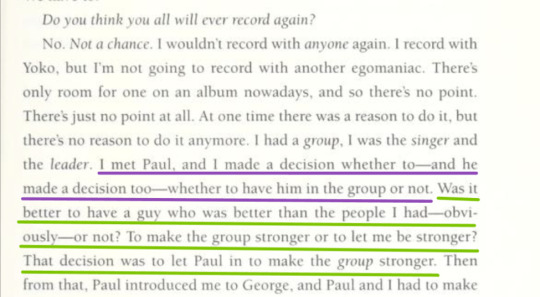
“I met Paul, and I made a decision whether to—and he made a decision too—whether to have him in the group or not.” Emphasis mine.
So John is not talking strictly about his decision, he’s talking about Paul and his mutual decision to work together. Without this context, even without the change from “that” to “my”, John seems to be discussing his own decision. Lewisohn’s change is completely unnecessary to get across his point. It’s as if he made this change specifically to push back against John Lennon’s assertion that a young Paul McCartney had autonomy and didn’t simply exist to satisfy John’s whims.
Tune In 8-4 vs. Wenner p.133-4 (3:54:42) + Davies p.44-5
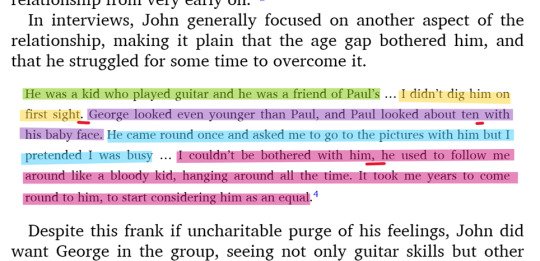

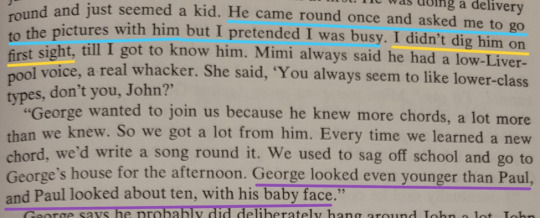
Color-coded to show the absolute chopped salad Lewisohn made of these two sources.
Also of note is Lewisohn’s follow-up to this quote, “Despite this frank if uncharitable purge of his feelings….” Lewisohn does this elsewhere (notably with John’s quote about hitting women): he follows up a self-critical quote from John with an authorial “Aw, don’t be so hard on yourself, buddy!” It’s unnecessary.
Tune In 8-28 vs. Wenner p.140 + The Mike Douglas Show


Lennon: He’s the greatest rock ‘n’ roll poet, and I really admire him.
Douglas: Do you feel the same today as you did years ago in Liverpool about rock?
Lennon: When I hear rock, good rock, of the caliber of Chuck Berry, I just fall apart and I have no other interest in life. Y’know, the world could be ending if rock ‘n’ roll’s playing, y’know. It’s a disease of mine.
I wasn’t able to find this quote in the interview audio, but I’m sure its there somewhere. I used Lennon Remembers as a guide to find the correct location of a certain segment in the 4+ hour audio, and it is apparent that certain parts of Lennon Remembers have been reordered.
I transcribed this section of the Mike Douglas Show from a video posted on the Shanghai-based streaming app BiliBili - see link in my source list.
Lewisohn uses an ellipsis to indicate a transition between two totally different sources here but does not use an ellipsis to indicate the phrases he left out of the Wenner interview. There are several small changes to the quote from the Mike Douglas show as well, but the meaning is retained.
Tune In 22-78 vs. Robinson 1975 + Wenner p.122 (1:33:20)

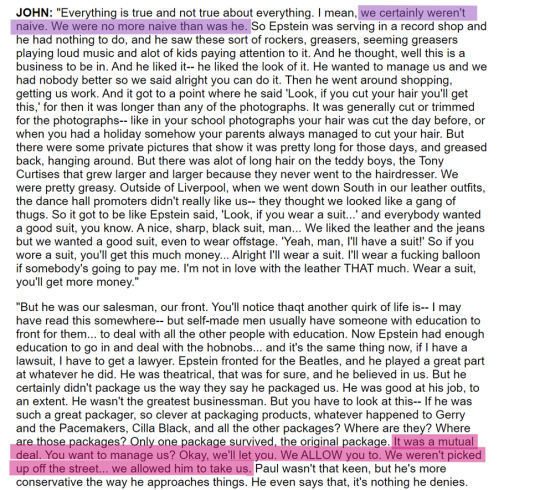

The first source here is Lisa Robinson’s 1975 interview with John for Hit Parader. You can find a version of this interview here. Note the lack of ellipsis between the purple and pink sections, despite the lengthy omission between them.
Lewisohn does use an ellipsis in the Wenner-derived portion of this quote, but he doesn’t place it correctly. The omission occurs between “and” and “Brian”, not between the rest of the quote and “and Brian.”
It wouldn’t make sense to include Allen Klein and Yoko Ono in this quote as it appears in Tune In, since they won’t appear until much later in the series, but I do wonder if presenting the quote without their names truly preserves the quote’s meaning. However you feel about them personally, Allen Klein and Yoko Ono are two of the most controversial figures in Beatles’ history. Within a few years of this interview, John would be on the outs with Allen Klein. John describes himself as someone who “make[s] a lot of mistakes character-wise”, and goes on to list three examples of his good judgments. Two of those are Allen and Yoko. Is it intellectually honest to delete those two names from the list and present Brian as the one example of John’s character judgment?
And our final Wenner Frankenquote. This one isn’t from Lennon Remembers, but from a 1970 Rolling Stone article titled “The Beatles: One Guy Standing There, Shouting ‘I’m Leaving’.”
Tune In 22-72 vs. Wenner 1970 + Robinson 1975



This one is audacious enough to warrant its own post—and we’re in luck! I defer to @mythserene's post for proper analysis. You can also find this one discussed in @anotherkindofmindpod's "Fine Tuning: Ep 7 Spanner in the Works."
In brief, in the ‘quote’ lifted from Wenner’s interview, John is using “Epstein” as a stand-in for Klein. John’s not saying “Three of us chose Epstein”—he’s saying “Three of us chose Klein, throw aside your assumptions about him for a minute.” It’s not the sort of quote you can divorce from its context if you have any credibility.
Some Context on Michael X and John Lennon:
Michael X (a.k.a. Michael Abdul Malik, born Michael de Freitas) was born in Trinidad and became a prominent member of the black Power movement in 1960s London. Lennon met Michael X early in 1970 and became a devoted supporter and advocate until Malik’s death in 1975 (Wiener 1991, p.115-123). Here’s a brief rundown of their involvement:
Since you’re the sort of person who reads citation-by-citation analyses of Beatles books, you have probably seen pictures from early 1970 of John and Yoko sporting matching pixie cuts. In January 1970, John and Yoko shaved their heads (as a publicity stunt, I assume?), and kept their shorn hair in a bag. This bag of hair was the centerpiece for their first public interaction with Michael X: in February 1970, Lennon and Ono gave Malik their bag of hair, and he gave them a pair of Muhammad Ali’s shorts. The press was very much present, but they failed to make headlines (Doggett 118). The hair was supposed to be auctioned off at Sotheby’s to support Malik’s Black House, but this fell through (see Lennon on The Dick Cavett show here.) Pictures of the event can be seen at The Beatles Bible.
Malik fled London for his native Trinidad when legal issues loomed in 1971. He started a commune there, which John visited in April of the same year. In 1972, the bodies of Joseph Skerritt and Gale Benson were found on the commune (Weiner 1991, p.118). Malik was convicted of ordering the killing of Skerritt and would be hanged for that crime in 1975 (NYT 1975 May 17).
Malik may or may not have ordered Skerritt’s murder, but regardless, he did not have a fair trial. John and Yoko campaigned from the time of his conviction up until his death for clemency, without result (Weiner 1991, p.119-123).
Sources:
Cavett D [host]. 1971 Sept 11. Interview with John Lennon and Yoko Ono. The Dick Cavett Show. Accessed online on 2024 Feb 23. Available from: https://ghostarchive.org/varchive/7kXCnKfdGOY.
Cleaver E. 1968. Soul on Ice. New York (NY): Dell Publishing Co., Inc. 210p. Accessed online. Available from: https://archive.org/details/soul-on-ice-by-eldridge-cleaver/
Davies H. 1968. 2009 Edition. The Beatles. New York (NY): W.W. Norton & Company. 408p.
Doggett P. 2009. You Never Give Me Your Money: The Beatles After the Breakup. New York (NY): HarperCollins. 390p.
Douglas M [host]. 1972 Feb 16. Season 11 Episode 123. The Mike Douglas Show with John Lennon & Yoko Ono. Accessed online 2024 Feb 23. Available from: https://b23.tv/mQMUDg9
Militant Is Hanged by Trinidad After Long Fight for Clemency. 1975 May 17. New York Times.[Internet] [cited 2024 Feb 24]. Available from: https://www.nytimes.com/1975/05/17/archives/militant-is-hanged-by-trinidad-after-long-fight-for-clemency.html
Robinson L. 1975 Dec. Interview with John Lennon. Hit Parader. Accessed Online from www.beatlesinterviews.org. Available from: https://web.archive.org/web/20230409044146/https://www.beatlesinterviews.org/db1975.1200.beatles.html
Wenner JS. 1970 May 14. The Beatles: One Guy Standing There, Shouting ‘I’m Leaving’. Rolling Stone. Accessed online. Available from: https://web.archive.org/web/20231017203039/https://www.rollingstone.com/music/music-news/the-beatles-one-guy-standing-there-shouting-im-leaving-43403/2/
Wenner JS. 1970. 1970 12 08 John Lennon Interview, Rolling STones Lennon Remembers, Complete Unedited [video]. Youtube. 2022 Apr 18, 4:26:50. Accessed 2024 Feb 18. Available from: https://www.youtube.com/watch?v=-YelhzUbrCE
Wenner JS. 1971. 2000 ed. Interview with John Lennon and Yoko Ono. Lennon Remembers. London: Verso. 151p. Accessed online. Available from: https://archive.org/details/lennonremembers00lenn_0/
Wiener J. 1984. 1991 Illini Books ed. Come Together: John Lennon In His Time. Urbana: University of Illinois Press. 379 p. Accessed online. Available from: https://archive.org/details/cometogetherjohn00jonw/
#mark lewisohn#tune in#the beatles#john lennon#jann wenner#lewi-sins#it's A LONG ONE#sorry#next post: pt 1 of my kim bennett manifesto#edit bcuz i forgot to add my sources...lewisohn moment
17 notes
·
View notes
Text
"Je ne suis pas là pour te divertir.
Je ne suis pas là pour te réparer.
Je ne suis pas là pour te sauver, te guérir ou te ranimer.
Je ne suis pas là pour te faire parler.
Je ne suis pas là pour te donner toute mon énergie.
Je ne suis pas là pour faire de ton histoire la mienne.
Je ne suis pas là pour t'écouter sans cesse.
Je ne suis pas là pour te faire plaisir. Je ne suis pas là pour te dissiper.
Je ne suis pas là pour te distraire de l'ennui et de la banalité.
Je ne suis pas là pour masquer ta tristesse et nourrir ton cœur fragile.
Je ne suis pas là pour te tenir la main. Je ne suis pas ici pour régler tes blessures d’âme.
Je ne suis pas là pour te livrer au monde.
Je suis là pour t'aimer fortement !
Je suis là pour t'aimer de la même façon que je m'aime. Je suis là pour être un ajout à la joie que tu as déjà.
Je suis ici pour me reposer, mais pas m’effondrer en toi.
Je suis là pour te soutenir, t'entendre, te voir.
Je suis là pour te faire l'amour. Je suis ici pour t'aimer doucement, doucement et férocement.
Je suis ici pour vivre des choses avec toi. Je suis là pour t'accompagner.
Je suis là pour grandir à côté de toi...!!! "
Janne Robinson

25 notes
·
View notes
Text

"I am fire-if you want something salty and sweet, with no opinion, I am not the woman for you. I spit flames, often."
-Janne Robinson
51 notes
·
View notes
Text
My Hot Take on Jann Wenner
Over the last few days, Jann Wenner did an interview with New York Times about his new book of interviews The Masters: Conversations with Dylan, Lennon, Jagger, Townshend, Garcia, Bono, and Springsteen. As a result of his comments, the Rock and Roll Hall of Fame, which he co-founded, removed him from their board of directors. The comments he made when NYT asked why there were no black artists or female artists in the book, included:
“The people had to meet a couple criteria, but it was just kind of my personal interest and love of them. Insofar as the women, just none of them were as articulate enough on this intellectual level.”
He continued, “Stevie Wonder, genius, right? I suppose when you use a word as broad as ‘masters,’ the fault is using that word. Maybe Marvin Gaye, or Curtis Mayfield? I mean, they just didn’t articulate at that level.”
The next day he issued an apology:
“‘The Masters’ is a collection of interviews I’ve done over the years,” he continued, “that seemed to me to best represent an idea of rock ’n’ roll’s impact on my world; they were not meant to represent the whole of music and its diverse and important originators but to reflect the high points of my career and interviews I felt illustrated the breadth and experience in that career. They don’t reflect my appreciation and admiration for myriad totemic, world-changing artists whose music and ideas I revere and will celebrate and promote as long as I live. I totally understand the inflammatory nature of badly chosen words and deeply apologize and accept the consequences.”
Let me begin my response to this by stating that from a young age of about 9, I was a big fan of Rolling Stone magazine. Over the years many readers have complained and said it's not what it once was, they are stuck in the 60s, yada yada yada. I always enjoyed reading it and I am still a subscriber of their print and digital magazine to this day. Which is why Wenner's interview is so disappointing, anger-inducing, and frustrating.
If Wenner just wanted to release a book of his personal favorite rock stars, just say that. But to call it The Masters and for one of the leaders of music journalism to call it that, it's implying that these musicians are the high standard of rock history. For him to respond to why there were no black or female musicians in his book by saying that they "don't articulate at that level" is false, racist, sexist, vile and ignorant for countless reasons. Off the top of my head:
Rock music as a genre was based on blues music, which was invented by black musicians. Therefore there would be no Rolling Stones, Beatles, etc without blues music and those musicians in his book would easily attest to that.
No black musicians could articulate at that level? Really? Did you really just say that Jann Wenner? Because Rolling Stone has often emphasized black musicians who were the architects of rock music like Chuck Berry, Bo Didley, Little Richard, Ray Charles, Fats Domino, Muddy Waters, John Lee Hooker and more, which is why I'm shocked you'd say that. To completely dismiss black musicians like Curtis Mayfield, Jimi Hendrix, Marvin Gaye, James Brown, Prince, Stevie Wonder, Al Green, George Clinton, Otis Redding, Sly and the Family Stone, Michael Jackson, Smokey Robinson, Sam Cooke, Bob Marley, Run D.M.C., Public Enemy, Living Colour, and the Bad Brains is denying rock history.
Female musicians were often in the background of the early days of rock music, i.e. songwriters, singing in a vocal group, or a back-up singer. But again, Rolling Stone often emphasized female musicians with their frequent Women In Rock issues, most notably their 1997 issue with Tina Turner, Madonna and Courtney Love on the cover. But to deny female musicians like Tina Turner, Dusty Springfield, Ronnie Spector, Aretha Franklin, Janis Joplin, Diana Ross, Joni Mitchell, Debbie Harry, Patti Smith, Stevie Nicks, Madonna, The Go-Go's, The Bangles, Courtney Love, Fiona Apple, Grace Slick, Kim Deal of The Pixies and The Breeders, The Runways, Karen O of the Yeah Yeah Yeahs, Aimee Mann, Liz Phair, Sinead O'Connor, Annie Lennox, Siouxsie Sioux, Beyonce, P.J. Harvey, Kim Gordon of Sonic Youth, Exene Cervenka of X, Tina Weymouth of Talking Heads and Tom Tom Club, Moe Tucker and Nico of The Velvet Underground, The Donnas, and their contribution to rock is irresponsible.
If he is just kissing up to his famous friends and trying to show off the people he's known in his life then that is separate from illustrating the "master of rock music." His apology was just plain egotistical, i.e. 'look at me, I've hung out with Lennon and Bono and I was trying to show that.'
In the last few years it actually seemed like Rolling Stone was trying really hard to prove they were not just covering white males and their coverage / artists on the cover has been very diverse.
In 2020 when they revised Rolling Stone's 500 Greatest Albums of All Time list, The Beatles' Sgt. Pepper was de-throned at #1 and replaced by Marvin Gaye's What's Going On. Whether you agree with this or not, it definitely seemed like RS was trying to prove it wasn't just a list of white males and the list as a whole emphasized many more hip hop and female artists than the previous iteration.
RS itself has been a very progressive publication in music history. A place where they report rock music and the culture around it, i.e. politics, film, art, TV, comedy, etc. They have brought in extremely talented writers like Kurt Loder, Lester Bangs, Ben Fong-Torres, Cameron Crowe, David Fricke, Rob Sheffield, Jancee Dunn, Kim Neely and more. And the magazine itself was a lifeline for music fans everywhere to get the chance to read about music news and musicians you might not be learning about in your regional press and radio (pre-internet era that is). It's too bad that Wenner, who founded this publication is unaware of how out-of-touch his statements are in contrast with what the magazine represents. It does need to be stated that Wenner has not been involved with RS since 2019 and the magazine tried to distance itself from him after his statements. As for the Rock and Roll Hall of Fame, there is a lot to criticize about it, but at its core they are an institution that celebrates the history of rock music and have inducted numerous black and female musicians. Personally, I am appreciative of the fact that they added my documentary Life on the V: The Story of V66 to their Library and Archives' Permanent Collection last year. But I digress. Wenner's opinions do not align with what the Rock Hall is and should be about. This is a clear example of someone who founded a magazine and co-founded a Hall of Fame that is about celebrating music past, present and future and all that encompasses, but yet the founder is completely misguided and ignorant.
In the end, we are all entitled to our own opinions and we can say whoever we want is the best. And yes, this could be a case of a grumpy old boomer looking at rock history through his very narrow tunnel vision. But I just expected way more out of him and less offensive rhetoric.
#jann wenner#rolling stone magazine#music journalism#in the news#rock and roll hall of fame#music nerd
2 notes
·
View notes
Text

kelsiewanders
ɪ ᴡɪʟʟ ɴᴇᴠᴇʀ ʙᴇ ᴀ ᴡᴇʟʟ ʙᴇʜᴀᴠᴇᴅ ᴡᴏᴍᴀɴ .
.
I would rather pass my days lying in the middle of dirt roads, staring at the full moon with a bottle of summer red in my palms.
I would rather have kids when it suits me, not when society expects or throws shoulds.
I would rather live in a hammock on a beach for six months, and write like my soul means it.
I would rather be horribly broke at times, than married to a job because a mortgage payment has my ass on a hook.
I would rather own moments, than investments.
I would rather eat alone, than sit with women who bore me at “Wives’ Night.”
I would rather swim naked with bioluminescence, have it fall like fireflies from my hair, my breasts, my back.
I would rather do handstands naked in the moonlight when no one’s watching than pick bridesmaid dresses.
I would rather drink seven year old rum from a sandy bottle, smell of smoke and ash than sit in church.
I would rather learn from life than rack up debt, in a desk.
I would rather drink the ocean, again and again—celebrate being madly alive.
I would rather my love be defined by love itself, and nothing more or less.
I don’t need a ring on my finger to prove that I am in love.
I would rather take the chicken bus, than spend useless money in safe gated communities. Sit beside a goat, listen to raggaeton and eat green mango with sugar in a plastic bag sold from the woman who harasses the bus each time it stops.
I do not need a degree to prove that I am intelligent.
I do not need to own a piece of earth with some wood on top of it—to feel successful. No one truly owns the land, anyway—we just think we do.
My savings account has diddly to do with my richness.
I would rather sprawl my single ass out like a lioness each morning and enjoy each corner of my empty bed.
I will take a job I love and freedom over a pension, any day.
I will not work and work and work to live when my body is old and I am tired.
Stocks are for people who get boners from money.
Not everyone should have kids, and my eggs aren’t expiring.
I will not drink the societal Kool-Aid on a bus, nor will I drink it on a train....
Not on a plane, with a goat, in the rain, in the dark, in a tree, with a fox, in a box!
I will not jump through societies’ hoops and red tape, the treasure hunt in the rat race we chase.
If we must have milestones—mine will be measured by how much joy I have collected at the end of each day and how often in this life I have truly, deeply, opened.
Seek, see, love, do.
© Janne Robinson
16 notes
·
View notes
Text
i make a home here
in my always troubled soul.
i cry my thoughts out
my self doubt even.
the anchor
on my lovers’ validation
breaks.
free.
this oyster
stretches beyond me.
i break
as i heal.
i am home
this body is home.
these thoughts even.
i want to believe.
#poetry#love poem#3 am feelings#3 am mood#it's 3am#poem#poets on tumblr#book club#janne robinson#lovers#random late night thoughts#black lives are important#black lives count#black lives have value#black lives matter#poetsofinstagram#sad poetry#2am shitpost#new poets society#poets corner#heart been broke so many times#i cry so much#i am sad#always sad
16 notes
·
View notes
Text
My WVUD playlist and stream, 12/24/2022 - Holiday Special
Lucas King - Jedi Christmas
Samuel Kim - The Mandalorian x Carol of the Bells
Six13 - A Star Wars Chanukah
The Westerlies - Angels We Have Heard on High
Sault - Gods Will
Ike Sturm - Gloria
Samara Joy - O Holy Night (feat. The McLendon Family)
Cate Brooks - First Night
Leslie Odom, Jr. - Ma'oz Tzur (feat. Nicolette Robinson)
Chip Wickham - Winter
Sven Wunder - Jazz at Night
YoYo the "Pianoman" - Christmas Mood
Joel Ross - PRAYER
Stanley Cowell - Medley: A Xmas Suite
Criola クリオラ - The Christmas Song
Carolyn Koebel, Malcolm Dalglish - Psalm of Solstice
Kitka - Tec Peleite Zernju Zogtu (Latvia)
Sweet Honey In the Rock - Seven Principles
Jonathan Hultén - Dance of the Water Spirits
Laura Cannell & Kate Ellis - Merrows
Black Tape for a Blue Girl - Chanukkah, Oh Chanukkah
Odetta - Go Tell It On the Mountain
Janne Mark - Both in the World and yet Outside It (with Arve Henriksen)
Wilmington Handbell Ensemble - Ukrainian Bell Carol Fantasy
Max LL - Winter Village
(listen on Mixcloud)
4 notes
·
View notes
Text
Something else I did this year besides keep track of everything I watched, was keep a list/playlist of some of the songs I heard for the first time each month throughout the year. Gonna share a bunch of them here, because why not! Ones in bold are the faves I found myself listening to the most and probably have a permanent spot on my playlist c:
(don't judge me on some of these lol)
Rosa Himmel by Jonathan Johansson (and Molly Sandén's cover)
Nothing to Escape by Fairbanks & The Lonesome Light
Replica by Mol-74
Anti-Hero by Taylor Swift
Scheiße by Lady Gaga
Chill Like That by Sunday Scaries and PiCKUPLiNES
The Song That United the World from the Bill & Ted 3 soundtrack
This is How You Walk On by Gary Lightbody & Johnny McDaid
Sleepwalking by All Time Low
小喋日和/Koshaberi Biyori by FantasticYouth
On the Way Down by Wrabel
Splinter Wolf by Kohta Yamamoto
To Be Enchanted by Sleeping At Last
I Have Never Felt More Alive by Madison Beer
I Am Here by Lindsey Ray and Taiina
All Waters by Perfume Genius
Be the Song by Foy Vance
Now is the Start by A Fine Frenzy
Can't Go Back Now by The Weepies
Headphones by I'm From Barcelona
Gladiator by Jann
Cha Cha Cha by Käärijä
What a Life by Scarlet Pleasure
ゾッコン/Zokkon by Mono No Aware
It Could Have Been Me by The Struts
Bright Eyes by Art Garfunkel
How You Like That by Blackpink
Trying to Feel Alive by Porter Robinson
Bumpy Ride by Mohombi
海の幽霊/Spirits of the Sea by Kenshi Yonezu
Future Speeder by The Newton Brothers
Repeat Until Death by Novo Amor
A Symptom of Being Human by Shinedown
前前前世/Zenzenzense by RADWIMPS
なんでもないや/Nandemonaiya by RADWIMPS
C'est la Vie by Mika
Husavik (My Hometown) by Molly Sandén
One Last Song by Lord of the Lost
Apocalypse Calypso by Mika
青のすみか/Where Our Blue Is by Tatsuya Kitani
Akari by Soushi Sakiyama
Specialz by King Gnu
This Side of Paradise by Coyote Theory
More Than Words by Hitsujibungaku
Keep in Mind by 白鲨JAWS
OverThink by Fan Ka
Curazao by El Alfa, Farruko, Chael Produciendo
Just Pretend by Bad Omens
Scott Street by Phoebe Bridgers
0 notes
Text
I'm not one for quotas, so that's not why I support the board's decision.
It's the sheer emotional stuntedness of Wenner's outlook that has me raising my fist in solidarity with the HoF.
Smokey Robinson, Linda Ronstadt, Judy Collins, Buffy Sainte-Marie, Chuck D, Joan Baez, Vernon Reid . . . .
He probably didn't even get the smart, activist White guys covered.
1 note
·
View note
Text
查德基尔的桃色新闻
女演员吉尔·轩尼诗 (Jill Hennessy) 第一个承认,今年秋天她在纽约拍摄《秋天》的时间并不完全构成苦役。当然,她必须穿着高跟鞋和长晚礼服从梯子上爬下���。但这是一项带来巨大好处的演出——而且我们说的不是 401 (k)。理查·基尔(Richard Gere)作为她的花花公子前男友,就位于她的正上方。“有那么一刻,我从一个相当低的角度抬头看着他,”轩尼诗说。“容我们说,我有一个独特的观点。我想这一刻我真的要感谢上帝。我有多幸运?我会付钱让他们在这部电影中工作。”
谁不会呢?当然不是那些每天围观片场的忠实粉丝。“他在出租车里被拍摄,”这部将于明年秋天上映的爱情片的导演陈冲惊叹道,“突然这些女人开始大喊,‘这是理查·基尔!’” 有些人只是握紧双手,抱着头,试图看得更清楚。你每天都会看到它。”
事实上,基尔已经看到这一点几十年了。从他在 1980 年的《美国舞男》中扮演的沉思的雇佣种马,向我们展示了他的魅力,到他扮演的放荡记者的取悦观众的表演,让我们尖叫“走错了路!” 在去年夏天的《逃亡新娘》中,这位身高 5 英尺 10 英寸的演员对逃跑的朱莉娅·罗伯茨 (Julia Roberts)产生了催眠作用。“这种事随处可见,”他的密友、1986 年《权力的游戏》搭档凯特·卡普肖 (Kate Capshaw) 说道。“在餐馆里,走在街上,他们会向餐桌传纸条,送花。”
基尔已经 50 岁了,身体非常健康,他对 1969 年开始职业生涯时尚未出生的女性有吸引力。更重要的是:他知道这一点。当被问及他与 28 岁秋季搭档薇诺娜·赖德 (Winona Ryder)之间 22 岁的年龄差距时,他以特有的傲慢态度告诉《女装日报》, “这并不是那么牵强。” “如果我和一个女人在一起,没有人会说什么。”那个年纪。”
正是这种趾高气扬的自信让粉丝们对他的崇拜持续了二十多年。确实,头发已经变成银色了。这位曾经愤怒的年轻人现在是一名虔诚的佛教徒,他经常冥想,并不知疲倦地为将西藏从中国手中解放出来而奋斗。据报道,他于 1983 年通过他的朋友、 《滚石》出版商简·温纳 (Jann Wenner ) 认识了达赖喇嘛,他与达赖喇嘛的密切关系为他的性格增添了另一个维度。但这个温和的家伙内心却隐藏着一颗叛逆的灵魂。基尔自由奔放,充满危险的魅力,是女人最爱的坏男孩,尽管他注定会伤一些人的心。“理查德有点像一只波斯猫,”他的 1995 年第一骑士说道联合主演朱莉娅·奥蒙德。“你希望猫给予你注意力,而猫非常独立。但当猫想要从你这里得到它时,它是不可抗拒的。”
只要问问基尔的前妻辛迪·克劳福德就知道了,她在与兰德·格伯订婚的边缘承认,她仍然无法想象与基尔通电话。“这很难,”她在 1997 年 8 月告诉红皮书。“有点像,我不想重新爱上他。”
克劳福德的损失是凯里·洛厄尔的收获。这位 8 岁的前《法律与秩序》女演员将于明年初生下基尔的孩子。“这是我现在生活中真正的乐趣之一,”这位演员八月份告诉拉里·金。但如果基尔找到了他的灵魂伴侣,他也将坚持自己的自由。纽约室内设计师朋友莎朗·西蒙奈尔 (Sharon Simonaire) 表示,这段关系取得了成功,因为“凯里让他做自己,并因此爱他。她不想让他改变。”
基尔无法被驯服这一事实让女性变得疯狂。后来在 1978 年的《天堂之日》中与他合作的女演员布鲁克·亚当斯 (Brooke Adams) 于 20 世纪 70 年代初在曼哈顿市中心的一次派对上第一次见到基尔时,“他脾气暴躁、神秘、愤怒,”她回忆道。“他是我朋友的男朋友,但我认为他是世界上最性感的男人。当他把注意力集中在你身上时,你会感觉自己处于聚光灯下。”
时间并没有减弱他的魅力。“他听你的,”1996 年电影《原始恐惧》中与他搭档的劳拉·琳妮 (Laura Linney) 说道。“他立刻就对你是谁以及你是如何做到这一点感兴趣的。”
1997年与基尔一起主演的《红色角落》 的白灵被“他微笑中散发出的光芒”所吸引。在他们第一次见面时,“理查德给了我一个非常紧密、温暖的拥抱,消除了我所有的压力,”她回忆道。后来他对她进行了挠痒痒的攻击,这至少毁掉了一些镜头。他甚至把她介绍给他的家人。《红角》曼哈顿首映当晚,林坐在演员格林威治村公寓的钢琴前,为他们伴奏合唱《牧场上的家》。
77 岁的退休保险推销员霍默·基尔 (Homer Gere) 和 75 岁的家庭主妇多丽丝 (Doris) 在距离酒店仅 200 英里的锡拉丘兹 (Syracuse) 抚养着五个孩子。第二个孩子理查德是北锡拉丘兹中央高中体操队、长曲棍球队和滑雪队的成员,并在乐队中吹小号。“他是一位出色的体操运动员,但你不会称他为运动员;他是一名运动员。” “他有很多朋友,但他并不喜欢变得超级受欢迎。”同学查克·帕里 (Chuck Parry) 回忆道,他现在是雪城大学的一名牧师,放学后曾与基尔一起用吉他弹奏鲍勃·迪伦 (Bob Dylan) 的歌曲。
女孩们被自信的理想主义者所吸引,他们喜欢牛仔裤和军装夹克。基尔只和最聪明的人约会,比如稳重的黛安·弗雷德里克斯。“我们经常去看电影,”现已结婚并居住在新罕布什尔州的弗雷德里克斯 1984 年告诉《人物》杂志,“总是看老电影和怪物电影。人们倾向于认为他是一个性对象。我从来没有这样想过他。他太聪明了,无法做到这一点。” 1967年毕业后,基尔接受了体操奖学金,进入马萨诸塞大学阿默斯特分校主修哲学。但他爱上了表演,并于 1969 年退学,全职从事演艺事业。
尽管他在纽约度过了几年,成为众所周知的饥饿艺术家,但他从未缺乏关注。1971 年,当女演员佩内洛普·米尔福德 (Penelope Milford) 在一部外百老汇音乐剧片场遇见基尔时,她说,“他已经和剧组中的所有女孩约会过”,其中包括搭档、未来的迪斯科女主角维姬·苏·罗宾逊 (Vicki Sue Robinson)。“维姬·苏对我说,‘小心点。他会爱你并离开你,”与基尔约会了七年的米尔福德回忆道。“我当时想,‘不是我。’ 但他对我真的很好,然后突然他开始表现得冷漠,这就是问题所在。”
女人们不断地来。女演员莎莉·柯克兰 (Sally Kirkland) 回忆起 20 世纪 70 年代中期,仍然默默无闻的基尔 (Gere) 闯入她为罗伯特·德尼罗 (Robert De Niro) 和阿尔·帕西诺 (Al Pacino) 举办的众星云集的派对。“乔尼·米切尔也在场,还有多诺万。米克·贾格尔也坠毁了。但当理查德走进来时,我停了下来。我本来应该向人们打招呼,但我不能。我简直被迷住了。” 几年后,当时装设计师黛安·冯芙丝汀宝 (Diane Von Furstenberg) 在感恩节派对上遇见基尔时,她也是如此。“他走路像骑自行车的人,这吸引了我,”她说。“我知道我会抓住他。我勾引他了。”
巴西艺术家西尔维娅·马丁斯 (Sylvia Martins) 在 20 世纪 80 年代迷上了基尔,她说他们的浪漫持续了七年,因为“我们都很独立,而且都喜欢探索。” 他们一起前往婆罗洲丛林等充满异国情调的地方,他们乘坐直升飞机迫降在当地部落中,还有巴厘岛,基尔独自在火山上冥想。“这就是我们过去经常做的事情,并且发现它完全正常,”马丁斯说。但基尔吸引的其他女性的关注让马丁斯难以应对。“当女人开始向他扑来时,我感到受伤和悲伤,”她说。
基尔在银幕上的性感也很易燃。他在 1980 年的影片《舞男》中的正面全裸场景是主流电影中最早出现的场景之一。然而基尔没有理会美国的震惊。“在欧洲,”他后来告诉《Cosmopolitan》,“这是非常狭隘的事情。” 他恰逢百老汇舞台,在马丁·谢尔曼的《本特》中扮演同性恋大屠杀受害者,这也同样危险,引发了基尔是同性恋的谣言。当时,演员拒绝回应。几年后,当八卦蔓延到他与克劳福德的婚姻时,他在伦敦 《泰晤士报》刊登的一则广告中为他们的异性恋辩护。
不可避免的是,一些风险并没有得到回报。在凭借《军官与绅士》(1982)确立了自己在万人迷历史中的地位后,基尔拒绝了《虎胆龙威》和《华尔街》的主演,最终出演了《大卫王》和《离家出走》等一系列失败的影片。但在 1990 年的《风月俏佳人》中,他又以令人惊讶的异想天开的方式回归,饰演比佛利山庄一位心灰意冷的企业袭击者。该片最终在全球票房超过 4.6 亿美元,让朱莉娅·罗伯茨 (Julia Roberts)成为明星并证实了她的男主角发生了翻天覆地的变化:理查·基尔变得轻松起来。事实上,他非常渴望得到这个角色,以至于“他跳了起来,在桌子上跳舞”,电影制片人之一阿农·米尔坎回忆道。“他真的跳舞了。”
此后不久,基尔就得到了自己的漂亮女人:超模克劳福德。1991 年,他们在拉斯维加斯的一座教堂结婚。“我不想失去[她],”他当时说道。但这种情况并没有持续多久。“理查德在婚姻破裂后非常伤心,简直是崩溃了,”他的朋友莎朗·西蒙奈尔 (Sharon Simonaire) 说道,她将 1994 年的分手归咎于他们的年龄差异(他 45 岁,她 28 岁)以及克劳福德对基尔的佛教事业的不耐烦。一个不信奉新教的人,没有分享。“辛迪对他去印度和离开感到困扰,”西蒙奈尔说。
1995 年秋天,西蒙奈尔在曼哈顿的一家餐厅将基尔介绍给了她的朋友洛厄尔,两人擦出了火花。西蒙奈尔说,两人一起度过一个周末后,“凯里打电话说,‘他真是太有趣了。他把运动裤拉到胸前,走来走去,有点抓伤自己。” 这让她想起她父亲过去常常在家里开玩笑。”
四年后,基尔与洛厄尔和她与前夫演员兼导演格里芬·邓恩 (Griffin Dunne) 生下的 9 岁女儿汉娜 (Hannah) 一起安顿下来。三人共用一套宽敞的格林威治村联排别墅,里面装饰着 20 世纪 40 年代的法式家具、基尔从旅行中收集的东方艺术品以及他自己广受好评的黑白摄影作品。基尔向他的女主角赠送了他在印度逗留期间留下的红宝石、珍珠和披肩等礼物。她也宠坏他。九月,她在俯瞰哈德逊河的租用屋顶上为他举办了一场 50 岁生日派对。佛教僧侣诵经,100 多名客人享用亚洲美食,洛厄尔还展示了一段特制视频,其中包含基尔旧电视采访片段和朋友们的生日祝福。最后,派对嘉宾白灵回忆道,“凯里过来说道,“还有人想说‘嗨’。” ’她打开衬衫,露出了画在她[怀孕的]肚子上的脸。理查德哭了,他很感动。”
然而,当他的泪水干了之后,他的眼睛无疑又恢复了光芒。毕竟,这不是一个糊状的人。西蒙奈尔说,当他读到这个故事时,“我不知道他将如何生活。他可能像当今最性感的男人一样在房子里昂首阔步。”#ICT伪君子RichardGere
0 notes